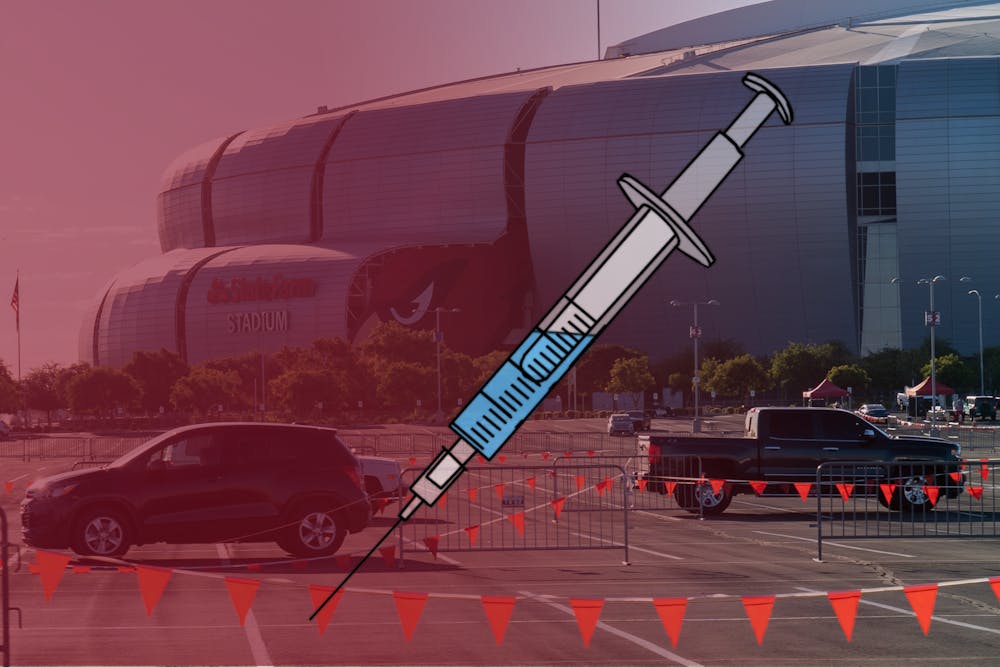Community assistants, along with approximately 11,500 other community members, are now eligible to receive the COVID-19 vaccine as part of both Phase 1A and 1B of COVID-19 vaccine distribution in Arizona.
The individuals eligible include "faculty, emergency workers, health workers, lab workers, police officers, those over 75, coaches and many staff and student workers in high student contact jobs," according to a University spokesperson.
In an email Wednesday, the spokesperson wrote these individuals have been informed of their eligibility by ASU's human resources unit and the University requests those vaccinated to "email a copy of their COVID-19 vaccination record card to Employee Health and Wellness."
The University does not yet have the total number of vaccinations that have been administered to the ASU community.
ASU President Michael Crow announced on Jan. 8 that faculty teaching in-person were eligible for the vaccine beginning Jan. 11.
READ MORE: In-person ASU faculty eligible for COVID-19 vaccine, Crow announces
Katie Hicks, a junior studying nursing, received the vaccine on Dec. 26 when the nursing clinical program at the University gave students the opportunity to volunteer to administer the vaccine during Phase 1A of the distribution plan.
That day, Hicks said she and 10 other students helped nurses and physicians administer the vaccine to people as they drove through a large parking lot at Chandler-Gilbert Community College.
“I actually got [the vaccine] on my lunch break when I was up there,” Hicks said. “There was kind of a lull in cars coming through the drive-through and they radioed over and said, ‘If any of the vaccinators want to get the vaccine, now is the time.’”
While more individuals become eligible to receive the vaccine, some, often guided by misleading information, question its validity and some refuse to receive it.
“At the hospital I work at, some of my co-workers were saying, ‘I’m not gonna get the vaccine because you don’t know what’s in it,’ but I talked to other nurses and there’s a great deal of research done on the vaccine,” Hicks said. If scientists have approved it and trust it, then the vaccine is safe to take, she said.
Ariana Afshari, a junior studying neurobiology and health and wellness director for USG who received the vaccine on Jan. 4 because she works in a pharmacy, has concerns the vaccine has become too politicized.
“The political climate is just so focused on the drama aspect of it, that finally we have real, tangible solutions and that’s not getting covered," she said. "It’s disappointing because I thought this would at least take off and I feel like it hasn’t."
According to data from the Centers for Disease Control and Prevention, Arizona has received 569,525 doses of the vaccine and 154,745 people have received their initial dose so far.
The Arizona Department of Health Services reported 5,629 new COVID-19 cases Wednesday. Data from the CDC shows Arizona is again the state with the most COVID-19 cases per 100,000 people.
As her concerns grew, Afshari decided to speak publicly about her experience receiving the vaccine on her Instagram story. There, she answered questions from her peers and provided links and instructions for determining one’s vaccine eligibility.
A video where Afshari filmed the process, monitored her temperature, oxygen levels, and heart rate, and showed the injection site, will be posted to the Undergraduate Student Government Instagram in the upcoming weeks, she said.
“I just wish that everyone was doing it because I feel like we’re gonna go through all four groups and then realize that we only vaccinated 25% of each of those groups,” Afshari said. “I felt like, for a long time, the general political culture was like, ‘where’s the vaccine, get it out faster,’ and the second it came out, the people I trusted to have faith in science didn’t.”
Editor Wyatt Myskow contributed to the reporting of this article.
Reach the reporter at kkwilso5@asu.edu and follow @kaceywilson_ on Twitter.
Like The State Press on Facebook and follow @statepress on Twitter.
Continue supporting student journalism and donate to The State Press today.





